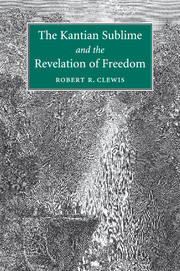Book contents
- Frontmatter
- Contents
- Preface and acknowledgments
- Abbreviations and notes on Kant's texts
- Introduction
- 1 The Observations and the Remarks
- 2 The judgment of the sublime
- 3 Moral feeling and the sublime
- 4 Various senses of interest and disinterestedness
- 5 Aesthetic enthusiasm
- 6 Enthusiasm for the idea of a republic
- 7 Conclusion
- Appendix 1 On the Remarks
- Appendix 2 Some features of the feelings discussed in this book
- Appendix 3 Classification of what elicits sublimity
- Bibliography
- Index
7 - Conclusion
Published online by Cambridge University Press: 02 July 2009
- Frontmatter
- Contents
- Preface and acknowledgments
- Abbreviations and notes on Kant's texts
- Introduction
- 1 The Observations and the Remarks
- 2 The judgment of the sublime
- 3 Moral feeling and the sublime
- 4 Various senses of interest and disinterestedness
- 5 Aesthetic enthusiasm
- 6 Enthusiasm for the idea of a republic
- 7 Conclusion
- Appendix 1 On the Remarks
- Appendix 2 Some features of the feelings discussed in this book
- Appendix 3 Classification of what elicits sublimity
- Bibliography
- Index
Summary
In this concluding chapter, I first summarize the main claims made in the book (section 7.1). I then consider a point that is a pressing issue for any interpretation (such as my own) that makes much of the sublime's connection with freedom. I examine whether we should endorse or repudiate Kant's grounding the sublime on transcendental and practical freedom (section 7.2). This issue is also important because commentators such as Malcolm Budd have argued that we should reject Kant's thesis. Although there may be some good reasons to reject Kant's thesis that the sublime is based on freedom, I believe that the arguments for endorsing Kant's thesis outweigh the arguments against doing so. I therefore think that we should follow Kant in grounding the feeling of the sublime on practical freedom.
Because it is based on and reveals human freedom, the feeling of the sublime is in a good position to be used for moral ends. Of course, this does not necessarily imply that it will be so used. Accordingly, I conclude the book with a few remarks about how the feelings discussed in the preceding chapters can contribute, even if only indirectly, to the achievement of moral ends (section 7.3).
SUMMARY
This monograph has examined the ways in which sublimity can indirectly contribute to the achievement of morality in the natural order.
- Type
- Chapter
- Information
- The Kantian Sublime and the Revelation of Freedom , pp. 215 - 227Publisher: Cambridge University PressPrint publication year: 2009



